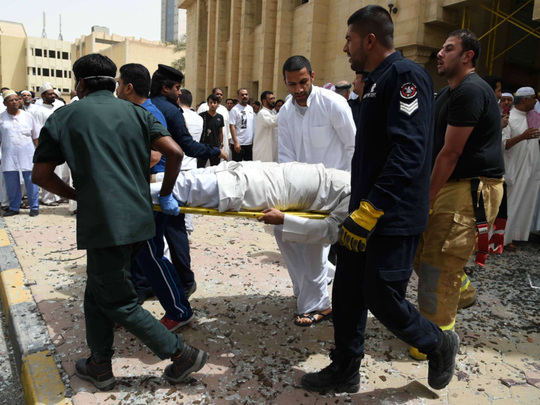
What are the root causes of the massacre that took place in the Shiite Imam Al Sadeq mosque in the heart of Kuwait City on Friday? Was such an attack expected or did it come suddenly, without warning? The answer is yes, it was expected. And there were plenty of warnings from writers and civil society alike. They had hinted on many occasions at the dangers of sectarian rifts. Just a few days before this terrible incident, there was a sharp verbal duel between a Sunni and a Shiite MP in the Kuwaiti parliament. It led to the Shiite MP submitting his resignation, saying that he was defending the honour of all Shiites in the world. There was a public outcry, with some saying that the incident was just the tip of the iceberg.
The sectarian tension in Kuwait has grown alarmingly as a result of various reasons. It had been swept under the carpet. But the fact is that it has its roots in culture and, of late, in politics.
Events in the region in the last couple of decades have produced sectarian hatred in countries throughout the Middle East. And Kuwait is no exception. A small number of Kuwaitis align themselves to one side or the other in the conflict, along sectarian lines. A small number of Sunnis think that Shiites are responsible for what is happening to their fellow Sunnis in Iraq, Syria and Lebanon. They mainly blame Hezbollah and Iran for the bloodshed. But they blame Shiites in general for the violence.
Sharply differing opinions
Meanwhile, a small section of Shiites support the Iranian Supreme Leader Ayatollah Ali Khamanei, and Hezbollah in Lebanon. They make no secret of this. And the media also plays a role, especially the social media. After every incident — for instance the recent attacks on Shiite mosques in Saudi Arabia — the social media in Kuwait is saturated with sharply differing opinions on the incidents.
Recently, Bahraini authorities announced the arrest of a small group of Shiites, trained in Iraq under the auspices of controllers from Tehran. The activists were accused of trying to commit a “terrorist act in Bahrain”. These kinds of incidents bring to the fore the radicals on both sides of the sectarian divide.
The question here is not what was the profile of the person who committed this barbaric act in the Imam Al Sadeq mosque but how did he manage to bring enough explosives to kill 26 innocent worshippers and injure more than 200 others? Also, who carried out the surveillance of the mosque for him, who transported him to the scene and, most of all, what is the kind of ideology people of his ilk adhere to? Acts of terror begin in the mind.
Unsurprisingly, the people of Kuwait immediately came together and every single person wanted to offer help. There were long lines of donors at the blood bank, to the extent that in a few hours there was a public statement from the bank saying that it had received all the blood it wanted. But the lines of donors were still getting longer.
One of the first at the scene of the crime was the Emir himself, Shaikh Sabah Al Ahmad Al Sabah. The head of state had felt the deep sorrow of the nation. Civil society groups immediately condemned the incident, which left a deep scar on Kuwaiti society.
Blood-thirsty groups
I believe Kuwait will not be the same again after this horrific attack. Kuwaiti society will have to engage in deep introspection to identify the root causes of this crime. Kuwaitis will have to understand the bloodthirsty nature of these groups and find ways and means to fight this satanic ideology wherever it comes from. This is easy to say, but hard to do, as societies love to sweep such issues under the carpet.
But by doing so the problem will not disappear. A number of articles have been published in local newspapers by liberal-minded writers demanding a “civil state” and seeking a ban on all politics practiced under a religious banner, whether Sunni or Shiite. I do believe that these voices will be joined by others in the days to come.
Mohammad AlRumaihi is a professor of political sociology at Kuwait University. You can follow him on Twitter at www.twitter.com/@rumaihi42










